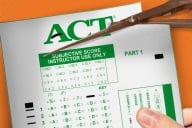You have /5 articles left.
Sign up for a free account or log in.
Law schools would no longer be required to use the Law School Admission Test to be accredited by the American Bar Association under a proposal adopted Friday by the Council of the ABA Section of Legal Education and Admissions to the Bar.
The council controls accreditation standards, although the ABA's House of Delegates could ask it to reconsider or adjust the plan adopted Friday. That plan goes beyond earlier proposals, which would have eased the process for law schools wanting to use other tests. The new proposal would simply kill the testing requirement. But the ABA would still evaluate whether law schools' admissions standards and academic programs assured the admission of students likely to succeed in law school and in passing bar exams. In most cases, those admissions standards are expected to continue to include a test, although the Graduate Record Examination may see increased use.
Under the current rule, law schools wanting to use tests other than the LSAT (to date entirely colleges wanting to offer alternatives but still accept the LSAT) had to conduct a validity study to show that the alternative test predicted success in law school.
A number of prominent law schools -- including those of Georgetown, Harvard and Northwestern Universities -- have conducted such studies, finding equal predictive value from GRE scores as from LSAT scores. But many other law schools have expressed interest in accepting alternative test scores but have not done such testing, which may not be necessary if the new rule takes effect.
The Law School Admission Council, which runs the LSAT, predicted that the new rules would not lead many law schools to change policies. The council is pleased that the proposed revisions "encourage law schools to continue to use a valid and reliable admission test in their admission decisions. Using the LSAT as one part of a holistic admission process best promotes quality, fairness, and diversity in law school admission," said a statement by Kellye Testy, president and CEO of the council.
"We expect that our member schools will continue to use the LSAT for substantially all of their admissions to provide transparency and fairness by evaluating all applicants using common and consistent standards. As a result, while these changes shift the responsibility for fair admission practices from the ABA to law schools, we do not anticipate significant changes for the vast majority of law schools or their applicants."
The Educational Testing Service, which runs the GRE, has a different perspective. ETS released a statement that said, "ETS and the GRE Program support the ABA’s proposal to eliminate Standard 503 [the testing requirement], because it will enable law schools to innovate in a principled way to more effectively address the challenges that they and aspiring law students face. With the proposed revisions … we believe law schools should continue to require their applicants to submit scores from valid and reliable tests, as they provide essential value in the admissions process. That’s why we conducted a national validity study which clearly demonstrated across a range of diverse and representative law schools that the GRE General Test is a robust, generalizable predictor of students’ success in law school."








